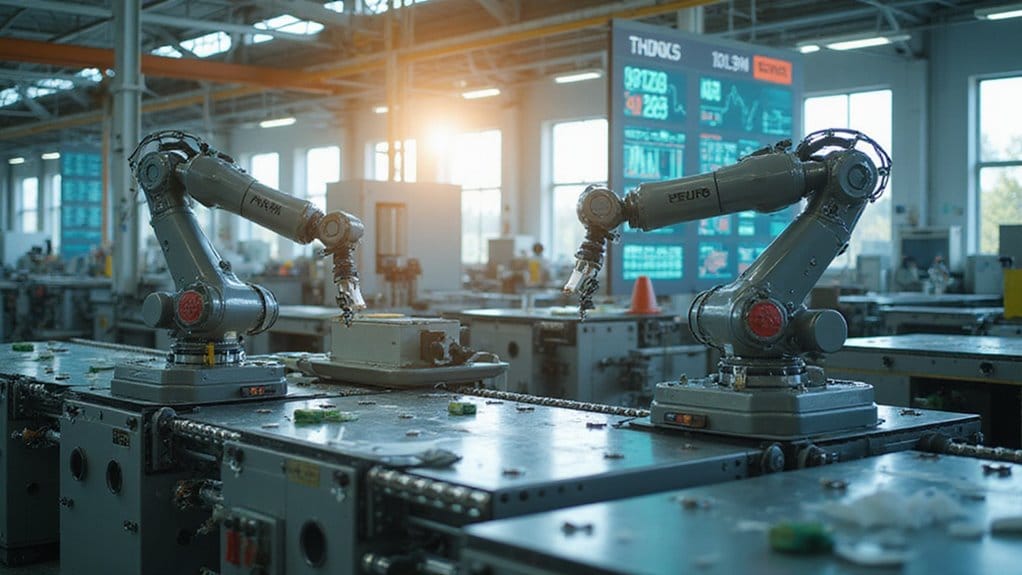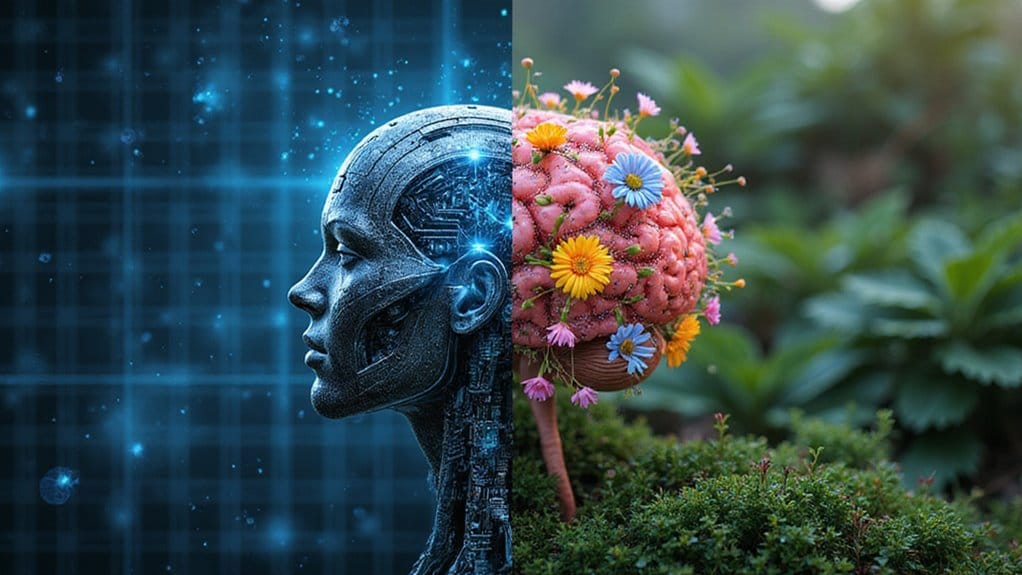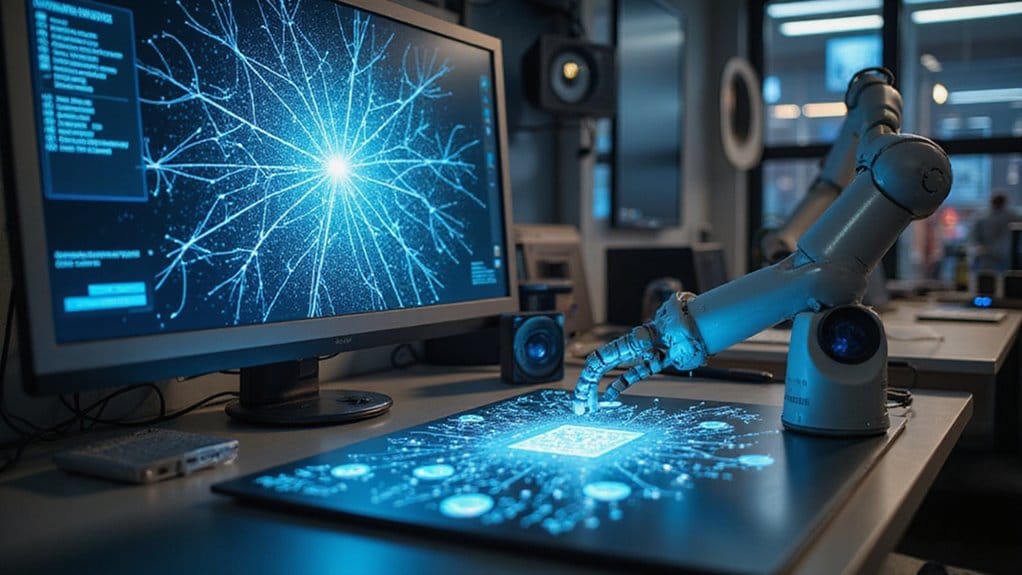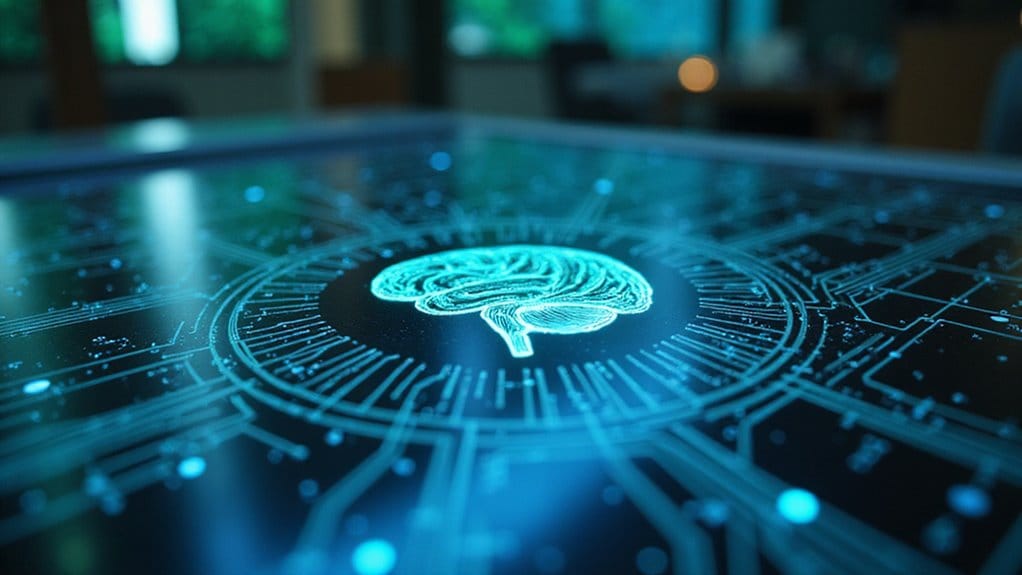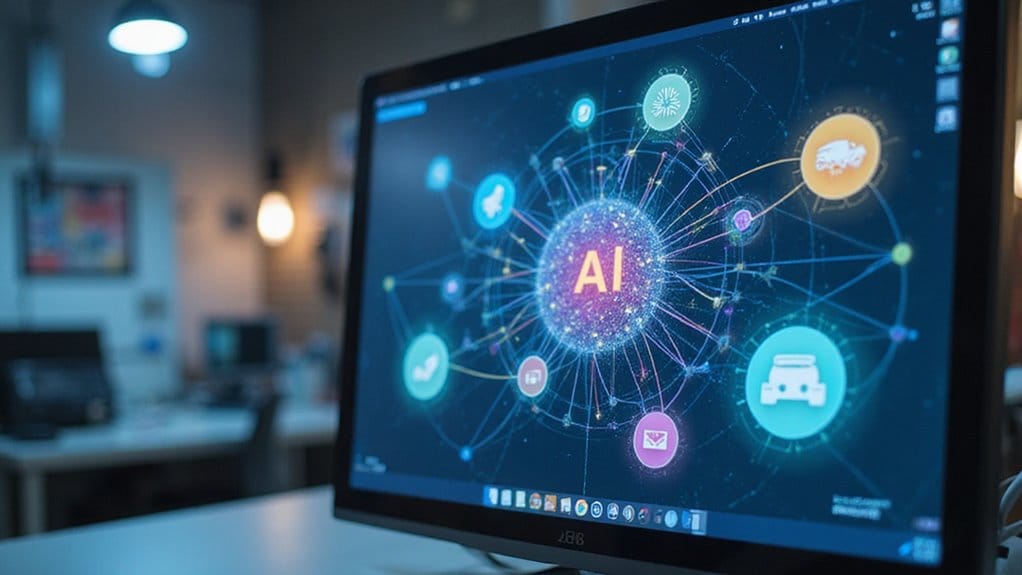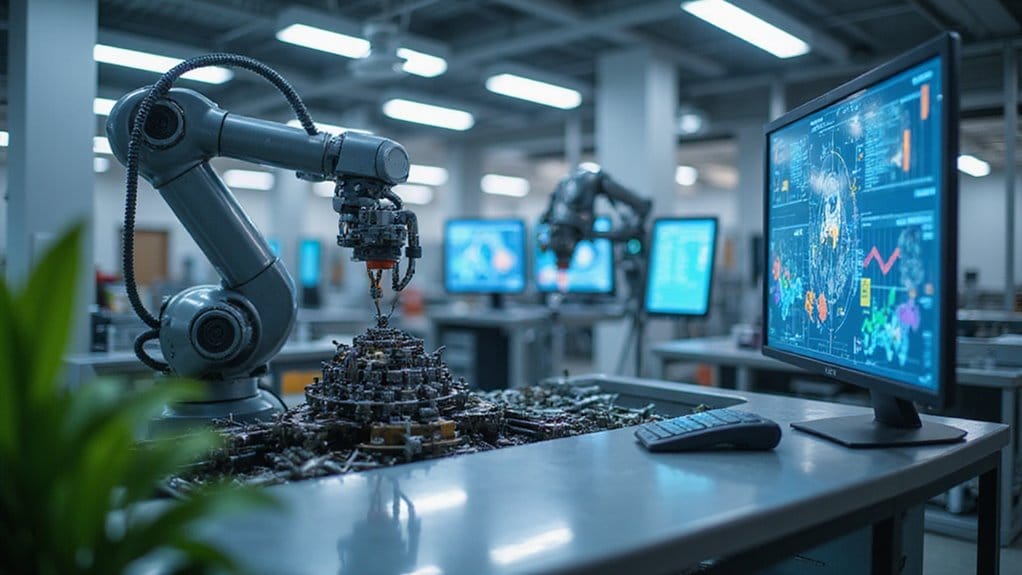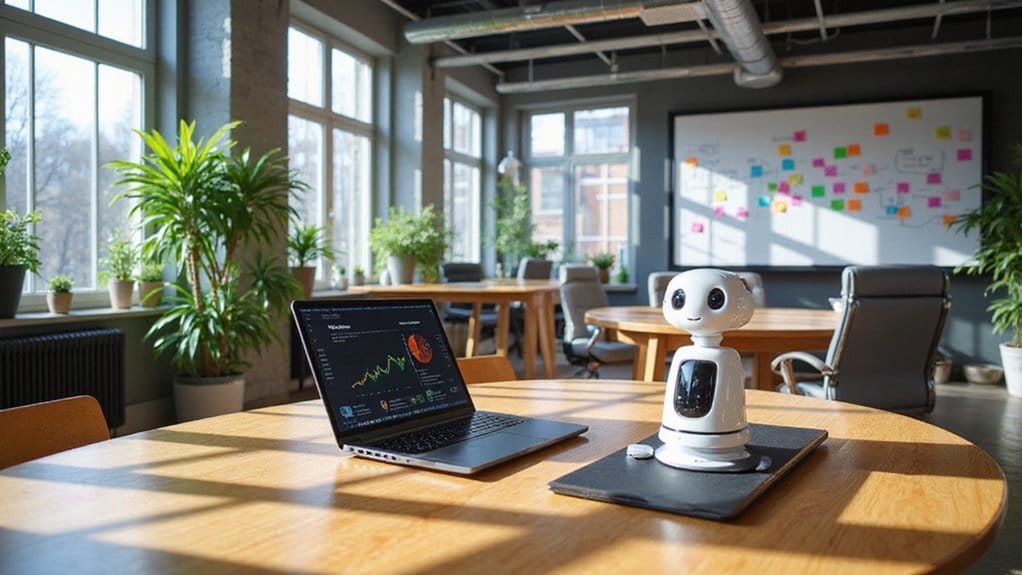AI is ringing the dinner bell for factories, promising efficiency and innovation. Gone are the days of tedious tasks! Think predictive maintenance—machines learn from data to avoid breakdowns, potentially slashing downtime by 45%. Quality control gets an upgrade; defects are caught faster, and waste? Nearly gone! So, what’s the catch? Manufacturers must adapt to thrive. If they don’t embrace AI, they risk being left behind. Curious about how this revolution works? Keep on exploring!
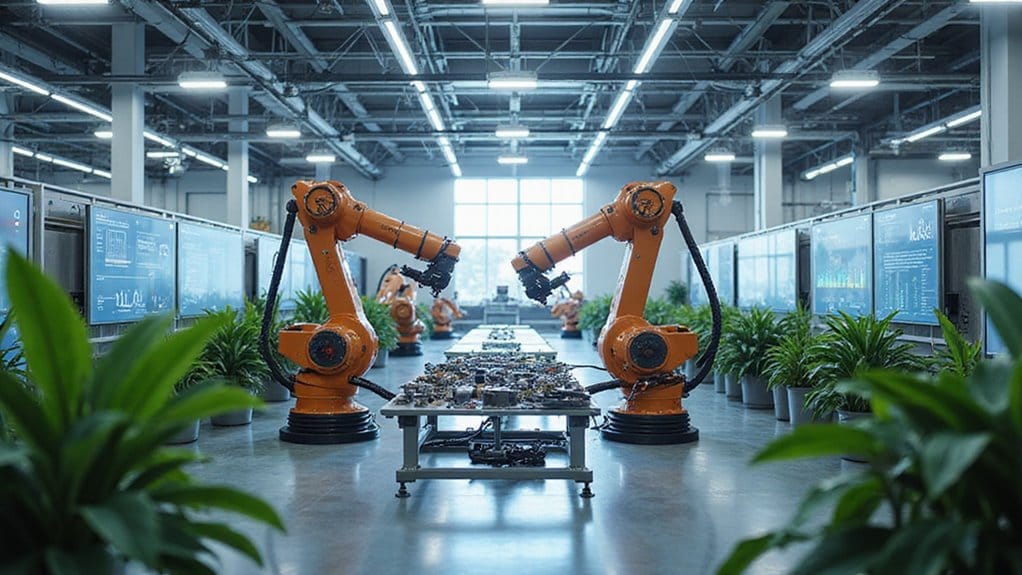
Artificial Intelligence is shaking up the manufacturing world like a snow globe in a blizzard. Gone are the days of tedious manual tasks and guesswork. Welcome to a new era where automation benefits reign supreme. With machine learning applications, factories are transforming into smart, adaptable environments ready to tackle the challenges of modern production.
Imagine a factory floor where robots don’t just follow orders but anticipate needs. That’s the magic of AI. Predictive maintenance, powered by machine learning algorithms, analyzes equipment data, forecasting potential failures before they happen. This means fewer surprise breakdowns—because who wants an unexpected maintenance crisis ruining their day? Instead of waiting for something to break, manufacturers can schedule maintenance proactively, cutting costs and improving resource utilization. AI enhances efficiency and reduces downtime through predictive maintenance, allowing manufacturers to optimize their operations. In fact, AI-enabled predictive maintenance can reduce maintenance costs by up to 30% and unplanned downtime by 45%. Additionally, predictive maintenance strategies can lead to more sustainable manufacturing practices by minimizing waste and energy consumption.
AI is revolutionizing factories with predictive maintenance, anticipating failures and transforming operations for greater efficiency and cost savings.
Quality control has also seen a radical makeover. With computer vision technology, AI can spot defects faster and more accurately than any human inspector. This isn’t just about fancy tech; it’s about reducing waste and ensuring that every product meets high standards. When AI is on the watch, the chances of sending out a flawed product plummet.
And let’s talk supply chains. AI-driven predictive analytics and inventory management streamline operations like never before. Forget about sluggish responses to market demands. With AI, factories can forecast demand and adjust inventory swiftly, ensuring that materials are always available when needed. It’s like having a crystal ball for manufacturing—who wouldn’t want that?
Finally, consider the future. By 2035, AI is expected to be a game-changer across industries, enhancing customization and precision in manufacturing processes. It’s time to embrace this tech revolution.
Factories that adapt to AI won’t just survive; they’ll thrive in a competitive landscape. So, gear up, manufacturers—it’s time to revolutionize your operations and take your place in this exciting new world. The future is not just coming; it’s already here!
Frequently Asked Questions
What Industries Benefit Most From AI in Manufacturing?
In the world of manufacturing, automotive production and pharmaceutical manufacturing stand out as prime beneficiaries of AI.
Why? Because AI optimizes processes, reduces errors, and enhances quality control.
Picture machines predicting failures before they happen—no more unexpected breakdowns!
Imagine faster drug production with fewer mistakes.
Embrace AI, or risk falling behind your competitors.
In these industries, staying ahead means integrating AI, and trust us, it’s not just a trend—it’s a necessity!
How Does AI Improve Supply Chain Management?
AI considerably boosts supply chain management through demand forecasting and inventory optimization. By predicting consumer needs, AI helps avoid that dreaded overstock or shortage.
Imagine cutting costs while keeping customers happy—sounds good, right? It analyzes vast data, spotting trends faster than you can say “warehouse chaos.”
Plus, with real-time tracking, logistics hiccups are tackled before they become nightmares. Embrace AI, and transform your supply chain from sluggish to super-efficient! Why wait?
What Are the Costs Associated With Implementing AI in Factories?
Implementing AI in factories comes with hefty implementation expenses, often skyrocketing costs up to 14 times more than expected.
Companies must conduct a thorough ROI analysis to see if the investment pays off.
Consider data management, specialized hardware, and talent acquisition expenses, which can pile up quickly.
Don’t forget ongoing maintenance costs!
So, weigh the potential benefits against these financial realities—because nobody likes a costly surprise, right?
Choose wisely!
Are There Ethical Concerns With AI in Manufacturing?
Ethical concerns with AI in manufacturing? Oh, they’re real!
Think job displacement—many workers may find themselves replaced by robots.
Then, there’s data privacy; sensitive info could be at risk if hackers get crafty. Manufacturers must guarantee compliance with laws like GDPR.
So, how to navigate this? Prioritize training for employees, implement strong security measures, and foster transparency.
Don’t ignore these issues; they can bite back harder than a malfunctioning machine!
How Can Small Manufacturers Adopt AI Technologies?
Small manufacturers can adopt AI technologies by first embracing AI integration, which means incorporating smart systems into their operations.
Start with technology training—yes, that means learning! Invest in upskilling your workforce to handle these tools.
Collaborate with AI service providers for guidance.
And don’t forget, a little data analysis goes a long way.
It’s time to jump on the AI bandwagon before your competitors leave you in the dust!
